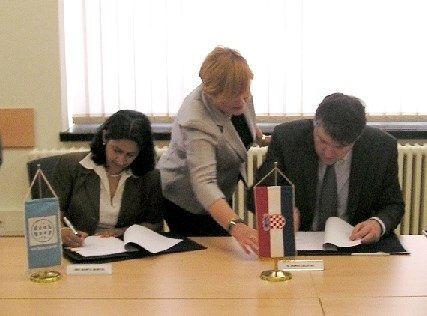- Published: 10.06.2014.
World Bank Supports Health of Croatians
Minister of Finance, Boris Lalovac and the World Bank’s Regional Director for Central Europe and the Baltic Countries, Ms. Mamta Murthi today signed a Loan Agreement in the amount of EUR75 million (US$103.5 million) for the Improving the Quality and Efficiency of Health Services Program for Results, The Program will be implemented by the Ministry of Health, the Croatian Institute for Health Insurance, the Agency for Quality and Accreditation in Health Care and Social Welfare, and overseen by the Ministry of Finance.
This new health sector Program aims to improve the access, quality, and efficiency of public health services by strengthening management capacity in health care, reorganizing the structure and activities of health care institutions, improving the quality of health care, strengthening preventative activities, and preserving the financial sustainability of the system.
The Program supports the Government of Croatia’s 2012-2020 National Health Care Strategy, which identifies the strategic problems and reform priorities for the health care sector, such as insufficient connectivity between primary, secondary, and tertiary health care; uneven quality of care; and uneven availability of health care across regions.
Croatia has achieved progress in improving the health system’s performance in terms of health outcomes and public satisfaction over the last twenty years. However, such results come at a high cost. Croatia spends 7.8 percent of its GDP on health, which puts Croatia at the top of the list compared to new EU members. In this fiscally-constrained environment, the Croatian health system faces a mismatch among available public resources, growing expenditures, and increasing needs due to the demographic and epidemiological changes in the country.
"The signing of this Loan is yet another confirmation of continuous implementation of reforms by the Government of Croatia with the aim of improving services, management and increasing the efficiency in all sectors, including the health sector. For many of our reforms we have received support from our partners in the World Bank and we thank them for their support," said Boris Lalovac, Minister of Finance of the Republic of Croatia.
"Through the 2012-2020 National Health Care Strategy we identified strategic problems and reform priorities for the health sector," said Mr. Marijan Cesarik, Deputy Minister of Health of the Republic of Croatia. “These are weak connectivity and insufficient continuity of health care at all levels in the health system – primary, secondary, and tertiary – followed by inadequate efficiency of health care and uneven access and quality of health care across regions. We also have relatively weak risk factor indicators – in other words, people’s behavior towards their own health.”
Cesarik added, "The Improving the Quality and Efficiency of Health Services Program support five out of eight priorities of the 2012-2020 National Health Care Strategy, which are aimed at resolving the biggest reform challenges in the health sector, including strengthening management capacity in health care, reorganizing the structure and activities of health care institutions, improving the quality of health care, strengthening preventative activities, and preserving the financial sustainability of the system. Thus, the loan proceeds are aimed at increasing the quality of health care and making health care services more efficient and accessible to all citizens of the Republic of Croatia."
"We are very pleased to support the Croatian Government with a Program that will focus on results and will also contribute to Croatia’s health goals by increasing access to a higher quality of health care services, especially for the poorest segment of the population, and by supporting a more equitable allocation of available resources for health," said Mamta Murthi, World Bank Regional Director for Central Europe and the Baltic Countries.
The Euro denominated loan is a Program for Result operation supported by a Flexible Loan for EUR, plus fixed spread, with 20-year maturity, including a 4-year grace period. This Program for Results is a new World Bank instrument, whereby loan funds are disbursed based on achieved outcomes.
Since joining the World Bank in 1993, Croatia has benefited from financial and technical assistance, policy advice, and analytical services provided by the global development institution. To date, the World Bank has supported 51 operations amounting to around US$3.5 billion, and approved 52 grants with a total value of US$70 million.
